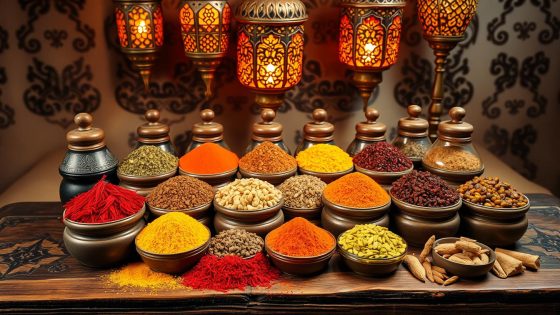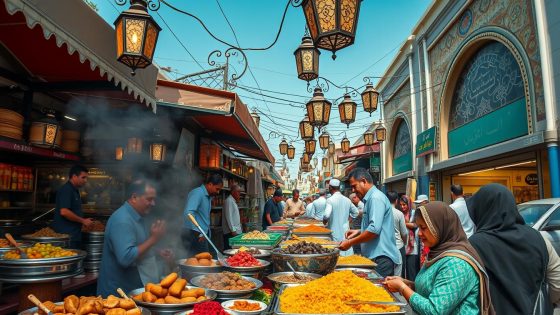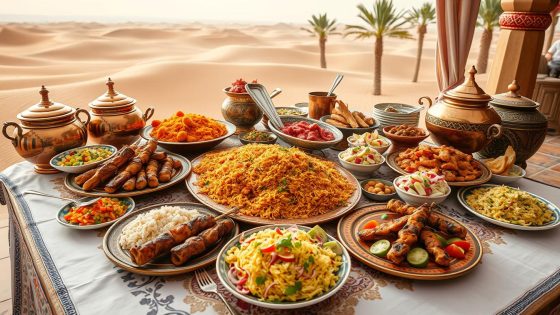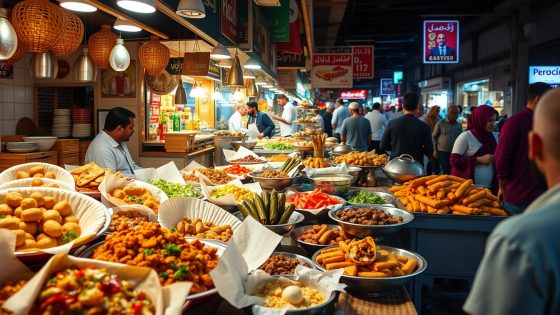Contents
The UAE’s spice scene is a treasure trove of flavors. Its strategic location has made it a hub for unique UAE spices. From the bustling Dubai Spice Souk to high-end markets, the country offers a wide array of exotic spices that shape Middle Eastern cuisine.
UAE’s spice trade is booming. Dubai’s non-oil foreign trade hit AED 2.4 trillion, with spices playing a key role. The country holds 60% of the global tea re-export market, showcasing its dominance in the spice trade.
What sets UAE spices apart? It’s the blend of cultures. Indigenous, African, and European influences have crafted unique flavor profiles. Emirati dishes highlight this mix, using local ingredients and time-honored spice blends.
From saffron to cardamom, each spice tells a story. They’re not just flavoring agents but bearers of tradition. UAE’s spices offer a taste of history, culture, and culinary innovation all in one.
Traditional Spices in Emirati Cooking
Emirati cuisine shines with its use of traditional spices. These aromatic spices form the heart of UAE’s culinary heritage. Let’s explore some key cooking spices that give Emirati dishes their unique flavor.
Saffron: The golden touch
Saffron adds a golden hue and rich taste to Emirati foods. This prized spice brings depth to both sweet and savory dishes. Its warm flavor enhances everything from rice to desserts.
Cardamom: Aromatic and flavorful
Cardamom pods lend a sweet, spicy aroma to Emirati cooking. This versatile spice works in savory stews and aromatic coffees alike. Its distinct taste is a staple in many regional spice blends.
Sumac: A tangy addition to dishes
Sumac brings a tart, lemony flavor to Emirati cuisine. This bright red spice adds zest to meats and salads. It’s often sprinkled on dishes just before serving for a pop of color and taste.
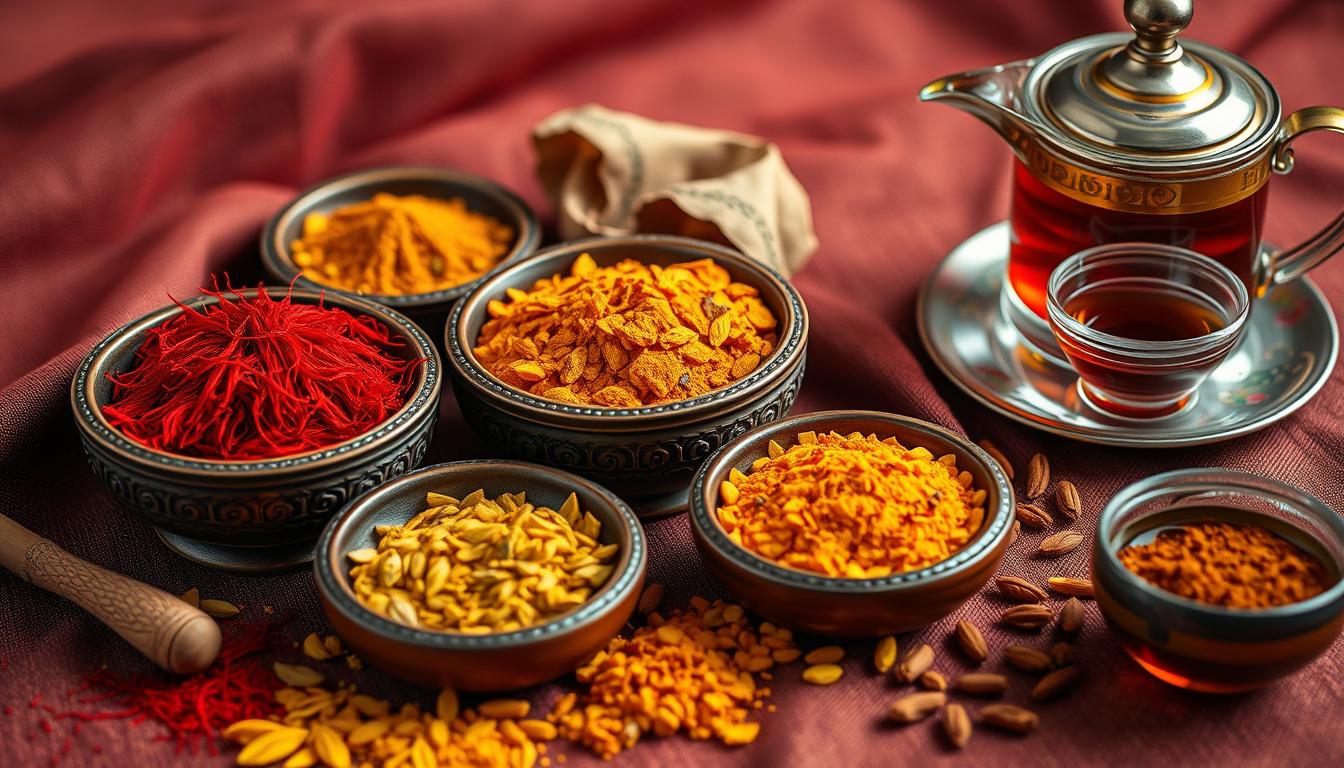
| Spice | Flavor Profile | Common Uses |
|---|---|---|
| Saffron | Earthy, slightly sweet | Rice dishes, desserts |
| Cardamom | Sweet, pungent | Coffee, meat dishes |
| Sumac | Tangy, lemony | Meat rubs, salads |
These traditional spices play a crucial role in Emirati cooking. They reflect the UAE’s rich cultural heritage and its historical ties to spice trade routes. By using these aromatic spices, home cooks and chefs alike can create authentic Emirati flavors in their kitchens.
Role of Spices in Emirati Cuisine
Spices are the heart of Emirati cuisine. They enhance flavors, preserve traditions, and create unique taste profiles. The careful selection of culinary spices reflects the UAE’s rich culinary heritage, blending Bedouin, Middle Eastern, and North African influences.
Enhancing flavor and aroma
Emirati cooks use spice blends to boost the taste and smell of dishes. Popular spices like saffron, cardamom, and sumac add depth to meals. These flavor enhancers transform simple ingredients into mouthwatering creations, making Emirati food stand out.
Preserving heritage through spice blends
Spice blends are more than just seasoning tips. They’re a link to the past. Traditional mixes passed down through generations keep Emirati food culture alive. The Dubai Spice Souk, with over 150 stalls, has been a hub for these aromatic treasures for more than 50 years.
Balancing heat and sweetness in dishes
Emirati cuisine is known for its perfect balance of flavors. Spices play a key role in achieving this harmony. Cooks use hot and sweet spices to create complex taste profiles. This skill is evident in popular dishes like machbous, harees, and luqaimat.
| Dish | Key Spices | Flavor Profile |
|---|---|---|
| Machbous | Cinnamon, Cardamom, Turmeric | Savory with warm undertones |
| Harees | Cumin, Black Pepper, Cinnamon | Earthy and slightly spicy |
| Luqaimat | Cardamom, Saffron | Sweet with floral notes |
Buying and Using UAE Spices
The UAE spice market offers a treasure trove of flavors for cooking enthusiasts. From traditional souks to modern supermarkets, spice shopping in the UAE is an adventure for the senses. Let’s explore the best ways to buy, use, and store these aromatic gems.
Best Places to Purchase Local Spices
The Dubai Spice Souk stands out as a prime destination for authentic UAE spices. Here, you’ll find a wide array of spice varieties, from saffron to sumac. Many vendors offer discounts, making it an economical choice for bulk purchases.
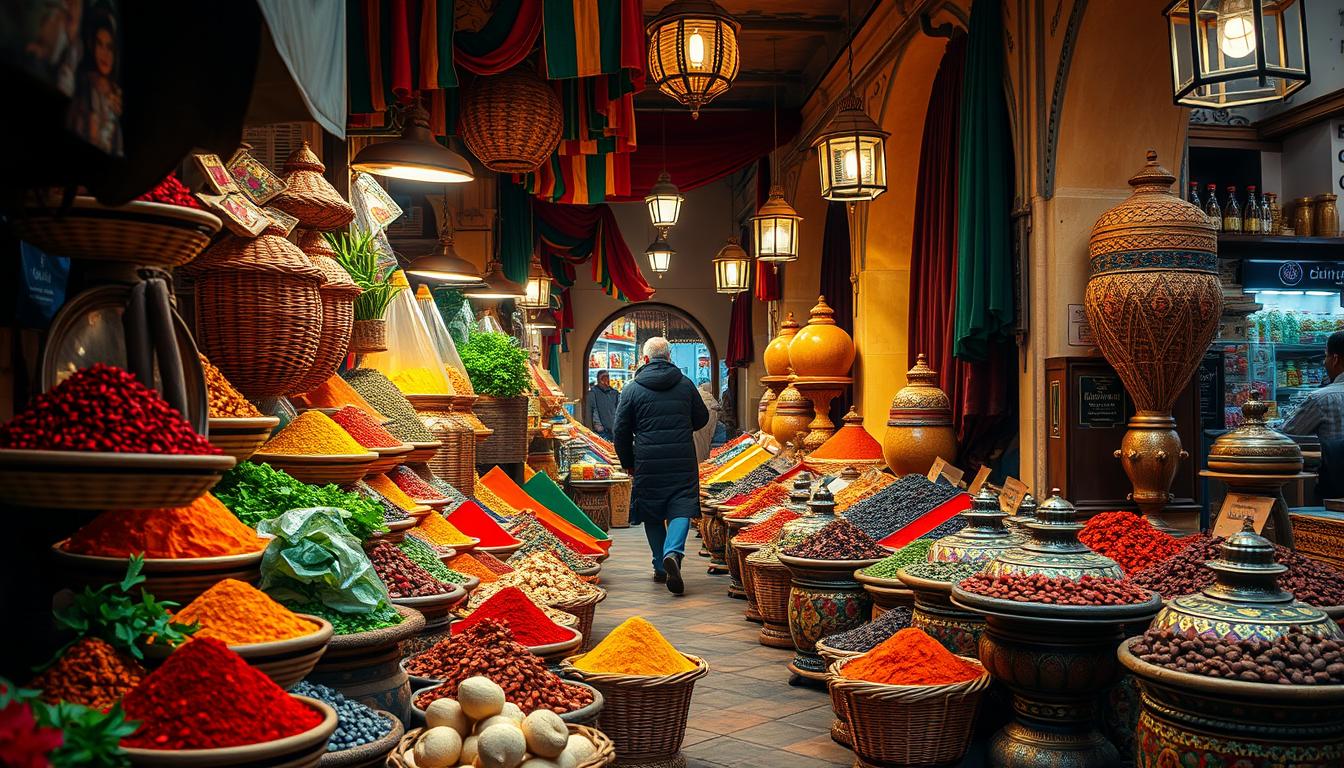
Tips for Creating Spice Blends at Home
Crafting your own spice blends is a rewarding way to enhance your spice recipes. Start with fresh, high-quality ingredients and experiment with different combinations. A basic mix might include cardamom, cumin, and coriander. Grind whole spices just before use for the best flavor.
Storing Spices for Long-lasting Freshness
Proper storage is key to maintaining the potency of your spices. Keep them in airtight containers away from heat and light. Glass jars work well for this purpose. Label each container with the purchase date to track freshness.
| Spice Category | Discount Range |
|---|---|
| Whole Spices | Up to 40% |
| Pre-packed Spices | Up to 39% |
| Essential Oils | Up to 42% |
| Rice Products | Up to 45% |
With these tips in mind, you’re ready to embark on your UAE spice shopping journey. Remember, the key to great Emirati cuisine lies in the quality and freshness of your spices.
Cultural Importance of Spices
Spices play a vital role in Emirati culture, weaving their aromatic threads through celebrations, trade history, and storytelling traditions. These flavorful ingredients are more than just seasonings; they’re a testament to the UAE’s rich heritage and global connections.
Spices in Emirati celebrations
During festive occasions like Ramadan and Eid, traditional spices take center stage in Emirati cuisine. Saffron-infused dishes and cardamom-scented coffee are staples at these gatherings. The cultural significance of spices extends beyond food, with some blends used in traditional medicine and natural remedies.
Historical trade routes and spice influence
The UAE’s strategic location along ancient spice routes has shaped its culinary landscape. This spice history is evident in the diverse flavors found in Emirati dishes today. The country’s role in spice trade has fostered strong ties with other nations, particularly India. In 2021, the UAE-India bilateral trade reached an impressive US$68.4 billion, highlighting the enduring impact of these historical connections.
Storytelling through spice traditions
Emirati families pass down the art of spice blending through generations, preserving their culinary heritage. Each spice carries symbolic meaning, reflecting the UAE’s cultural tapestry. For instance, the custom of making spiced coffee was recognized by UNESCO as an Intangible Heritage Site in 2015, underscoring its importance in Emirati hospitality. These spice uses and traditions continue to shape the UAE’s identity, linking past and present through flavor and aroma.
